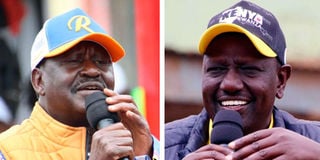Future of gender rule at the mercy of party leaders

Azimio la Umoja leader Raila Odinga and Deputy President William Ruto.
What you need to know:
- The Independent Electoral and Boundaries Commission on May 9 directed political parties to comply with the two-thirds gender rule in their nomination lists, women celebrated.
- This was a golden opportunity to achieve the elusive gender principle, whose implementation women leaders have unsuccessfully pushed for since the promulgation of the Constitution.
When the Independent Electoral and Boundaries Commission (IEBC) directed political parties to comply with the two-thirds gender rule in their nomination lists, women celebrated.
This was a golden opportunity to achieve the elusive gender principle, whose implementation women leaders have unsuccessfully championed since the promulgation of the 2010 Constitution.
The IEBC, in a statement, noted that a section of political parties disregarded the gender rule and so he ordered them to do so or risk being locked out of the August 9 General Election. The directive ignited a political storm, attracting criticism and support in equal measure.
In fact, the battle ended up in court, with the directive being challenged. Women were still hopeful that the court would affirm the move by the IEBC to compel political parties to comply. Their hopes have been dashed.
IEBC decision quashed
The High Court on Monday quashed the plan to lock out political parties that did not comply with the gender rule. Justice Antony Murima termed the IEBC decision unconstitutional, citing lack of public participation, reasonableness and procedural fairness.
The judge questioned the rushed manner in which the electoral agency moved to implement a judgment delivered on April 20, 2017, by the High Court, in a case filed by Katiba Institute. Political parties were found to be the first port of call in taking measures to formulate rules and regulations for actualising the gender principle.
Justice Murima, however, said the IEBC still has the opportunity to rectify the mistake and push for the enforcement of the rule in the 2027 General Election. The verdict now means the implementation of the gender rule falls squarely on political parties and their leaders.
In the past, political parties and their leaders have been accused of lacking the will to push for the enactment of the gender rule. Women can now hope that the parties will this time round walk their talk and help realise this constitutional requirement.
Some party leaders have already pledged to ensure the enactment of the gender principle after the August polls.
Azimio La Umoja
Azimio La Umoja One Kenya presidential candidate Raila Odinga, while launching his manifesto, pledged to take care of the rule in all government appointments. Mr Odinga has already named a woman, Narc Kenya leader Martha Karua, as his running mate.
“The Azimio La Umoja government will enforce the gender rule in elective and appointive bodies as provided for in the Constitution with a view to achieving gender parity.”
He added that his coalition’s ‘Azimio la Kina Mama’ programme will focus on wealth multipliers, who are women, to unlock access to financing for women-led businesses.
“Women constitute more than half of the country’s population, their potential contribution to the economy is, therefore, enormous. However, despite a progressive constitution that promotes gender equality and women’s empowerment, gender equality remains elusive,” said Mr Odinga.
Kenya Kwanza
Kenya Kwanza coalition presidential candidate William Ruto has also committed to realising the gender rule. Speaking during the launch of the coalition’s women charter, which seeks to enhance their total inclusion in the political and economic spheres, at Nyayo National Stadium, he committed to actualising the gender principle and putting in place mechanisms within the first three months of Kenya Kwanza administration if they win.
“I also commit to allocating 50 per cent of all Cabinet positions to the women of Kenya. Additionally, I commit that we will ensure that the Public Service Commission, in all its advertisements and recruitments, and all government agencies, commissions, and parastatals, strictly observe the two-thirds gender rule.”
Dr Ruto said the signing of the charter was a testament to Kenya Kwanza’s commitment to placing women at the centre of decision-making.
“Today marks a turning point in the governance of the republic of Kenya, where women can sit on an equal basis with men. Women will become equal partners, will have equal voice and will occupy equal positions in the highest decision-making organ. We will get rid of tokenism and piecemeal [measures] and ensure women are right at the table with other Kenyans,” he said.
IEBC manager in charge voter education Amina Soud recently challenged women caucuses to use their strength in political parties to amplify their voices for their benefit.
Legal foundation
Twelve years after the enactment of the new supreme law, there is no specific legislation to operationalise the constitutional provision on gender equality.
The gender dilemma has stalked the 10th, 11th and 12th parliaments, with all their four attempts to operationalise the rule failing to find a solution. Though four different bills have been introduced, they have all hit a snag in the plenaries of the National Assembly and the Senate.
The bills have embarrassingly been either withdrawn from being placed to a vote or suffered technical defeats, with the houses failing to raise the requisite numbers to warrant their consideration.
The gender rule mandates the state to take steps to ensure that not more than two-thirds of members of all elective and appointive positions are of the same gender.
Only 9.8 and 20.7 per cent of the 10th and 11th parliaments respectively were women, making it the lowest in East Africa.
The 12th parliament, which adjourned indefinably recently, comprised 97 female members, representing 23.3 per cent of the total membership, the highest since Independence.
Apart from the political arena, the under-representation of women in positions of power either in the Cabinet, senior government positions and state corporations have been a concern.





